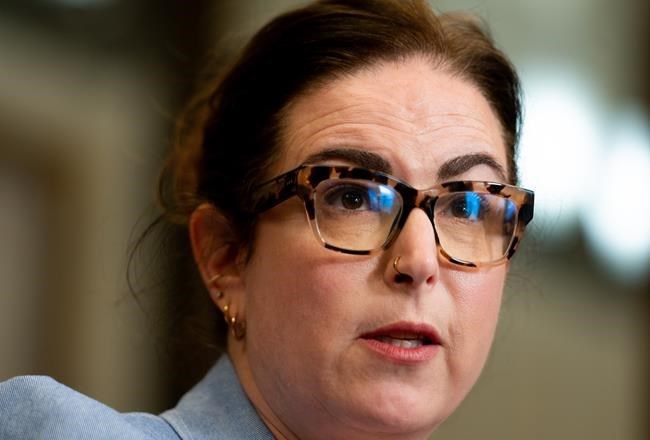OTTAWA — Addictions Minister Ya'ara Saks has rejected Toronto's request to decriminalize the possession of controlled drugs, citing concerns about public safety.
The decision was announced Friday evening before the long weekend, after weeks of immense political pressure from the Opposition Conservatives and the Ontario government to refuse Toronto's request.
The response Friday from the offices of Toronto Mayor Olivia Chow and Toronto’s medical officer of health Eileen de Villa indicated they were prepared for the denial, and pivoting to asking for other supports.
The city sent its proposal to Health Canada in January 2022 and, after more consultations, updated its submission in March 2023.Â
The proposal called for decriminalization to be paired with a host of more direct public health responses to the overdose crisis.
Saks says in a statement that she has determined Toronto's plan does not adequately protect public health and maintain public safety. One of her concerns is a lack of support from the provincial government, which has vehemently opposed the idea.Â
In response to a request for comment, Chow’s office shared a letter the mayor had written to Prime Minister Justin Trudeau and Ontario Premier Doug Ford, also dated Friday.
It says overdoses kill 2,500 Ontario residents each year, 500 of them in Toronto, while the wait time for treatment can be up to a year. The letter called for the three levels of government to work together, including by expanding access to treatment.
"Shared commitment and responsibility for increased treatment demands a collaborative pilot program focusing on a broad and bold approach … one which encompasses connections to primary care, supportive housing, harm reduction and partnerships with emergency services."
A statement from de Villa sent by Toronto Public Health said she supports the approach outlined in Chow’s letter.
"Decriminalization is one evidence-informed policy tool to help remove barriers to care. Increasing funding and access to a broad range of treatment options, which is the responsibility of the province, is another tool required to address the drug toxicity epidemic," the statement said.
Given Saks’ decision to refuse Toronto’s request, de Villa said, "the need to invest in other available evidence-based interventions is all the more critical."
The decision comes a day after Ontario Health Minister Sylvia Jones and Solicitor General Michael Kerzner wrote a letter to de Villa that said the province is "100 per cent opposed" to the application.
The ministers said the results of a "disastrous" pilot program in British Columbia prove that a decriminalization approach does not work.
"Instead, it encourages dangerous behaviour in public spaces, victimizes innocent people and undermines law enforcement's ability to protect our communities," they wrote.
The B.C. government recently received federal approval to recriminalize public drug possession, a major climb down for the first-of-its-kind pilot in Canada.
On April 26, the province announced that it had asked Health Canada to amend the exemption allowing the decriminalization of small amounts of drugs such as heroin, fentanyl, cocaine and methamphetamine.
B.C. Premier David Eby said his NDP government wanted to ban the use of those drugs in spaces such as hospitals and parks, following widespread concern from the public, nurses and police around consumption of drugs in public.
This report by The Canadian Press was first published May 17, 2024.
Laura Osman and Anja Karadeglija, The Canadian Press



